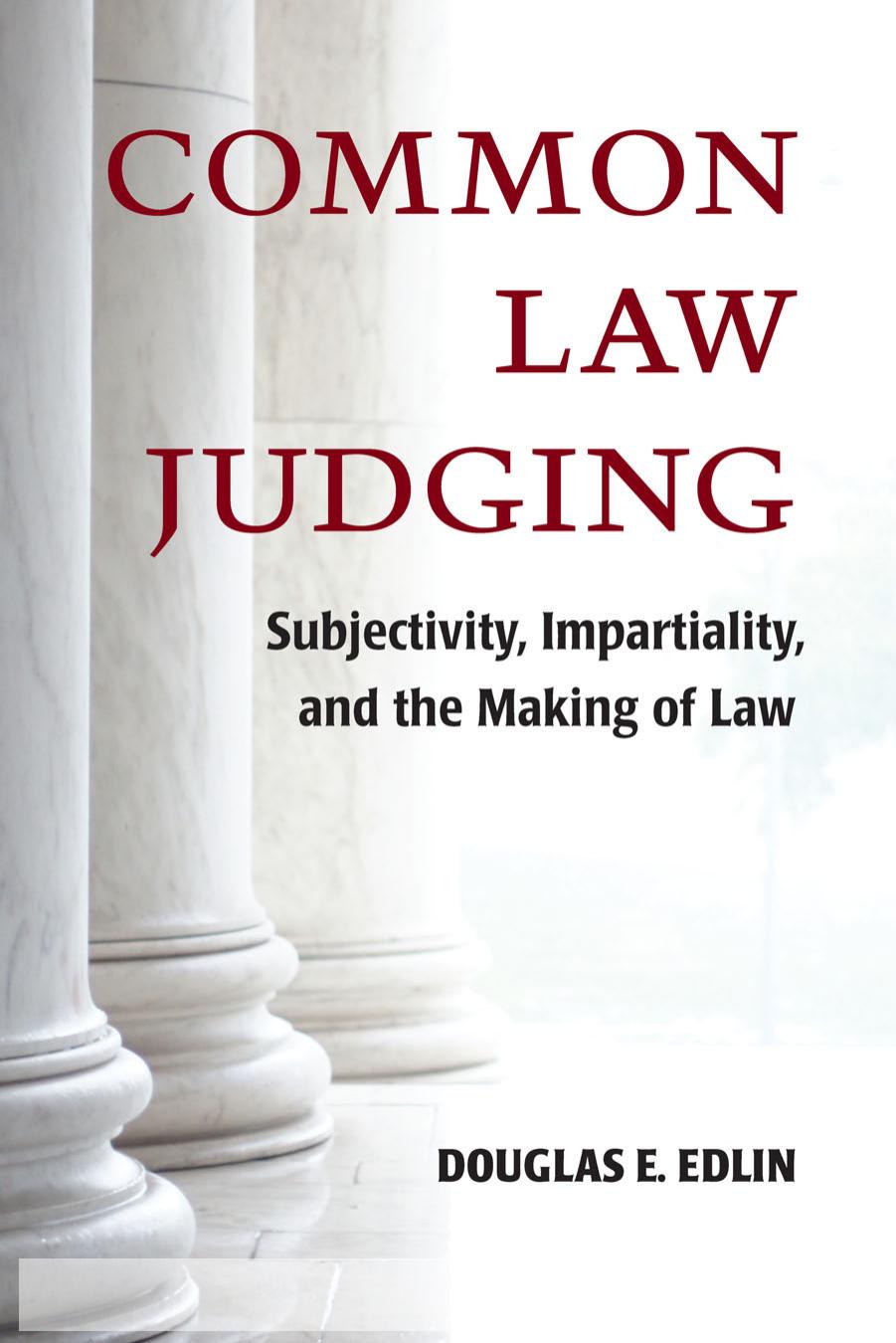Common Law Judging: Subjectivity, Impartiality, and the Making of Law by Douglas E. Edlin

Author:Douglas E. Edlin
Language: eng
Format: epub, pdf
Publisher: University of Michigan Press
Published: 2018-05-15T00:00:00+00:00
Chapter 2
1. Martha Minow, Stripped Down Like a Runner or Enriched by Experience: Bias and Impartiality of Judges and Jurors, 33 Wm. & Mary L. Rev. 1201, 1206 (1992).
2. Aharon Barak, The Role of a Supreme Court in a Democracy, 53 Hastings L.J. 1205, 1210 (2002). See also Aharon Barak, The Judge in a Democracy (Princeton University Press, 2006), 101–5; John Rawls, Political Liberalism (Columbia University Press, 1993), 236; Melvin Aron Eisenberg, The Nature of the Common Law (Harvard University Press, 1988), 9–10, 14–26; Harry H. Wellington, Common Law Rules and Constitutional Double Standards: Some Notes on Adjudication, 83 Yale L. J. 221, 244 (1973). This position is subtly but importantly different from the view that judges should engage in their own evaluation of the decision or interpretation that best expresses the public values of their society, government, and law (but may not yet be reflected in those public values). See, e.g., Ronald Dworkin, Law’s Empire (Harvard University Press, 1986), 167–68, 225–28, 255–56. Here it is less clear where the judge’s own moral evaluation ends and where the incorporation of public morality, as understood by the judge, enters into the articulation of the law.
3. See above at 16.
4. See W. Preston Warren, Modes of Objectivity, 39 Phil. & Phenomenological Res. 74, 83 (1978). Functional effectiveness can also be thought of as “procedural objectivity.” See Jules L. Coleman and Brian Leiter, Determinacy, Objectivity, and Authority, 142 U. Pa. L. Rev. 549, 596 (1993) (“Legal decision‑making procedures are designed to forge compromises among conflicting interests as well as to establish ground rules on which individuals with conflicting all‑encompassing theories or political and philosophical conceptions might agree. . . . [P]rocedural objectivists share the view that what justifies the outcomes of legal disputes is the fact that judges reach them by following objective procedures.”).
5. See, e.g., Paul Gewirtz, On “I Know It When I See It,” 105 Yale L.J. 1023, 1025 (1996) (“From this perspective, the exercise of judicial power is not legitimate if it is based on a judge’s personal preferences rather than law that precedes the case, on subjective will rather than objective analysis, on emotion rather than reasoned reflection.”).
6. See Richard A. Posner, The Problems of Jurisprudence (Harvard University Press, 1990), 37; George D. Braden, The Search for Objectivity in Constitutional Law, 57 Yale L.J. 571, 572 n. 5 (1948) (“By objectivity I mean that quality of a rule of law which Page 149 →enables it to be applied to similar situations with similar results regardless of the identity of the judges who apply it.”).
7. See, e.g., David Lyons, Open Texture and the Possibility of Legal Interpretation, 18 Law and Phil. 297, 298–308 (1999).
8. A good example here is the work of scholars to apply Wittgenstein’s approach to rule following to ascertain whether legal rules are being followed. See Brian Bix, Law, Language, and Legal Determinacy (Oxford University Press, 1993), ch. 2; Dennis Patterson, Law and Truth (Oxford University Press, 1996), 12–15. For an argument that philosophical disputes about language
Download
Common Law Judging: Subjectivity, Impartiality, and the Making of Law by Douglas E. Edlin.pdf
This site does not store any files on its server. We only index and link to content provided by other sites. Please contact the content providers to delete copyright contents if any and email us, we'll remove relevant links or contents immediately.
| Comparative | Conflict of Laws |
| Customary | Gender & the Law |
| Judicial System | Jurisprudence |
| Natural Law | Non-US Legal Systems |
| Science & Technology |
Future Crimes by Marc Goodman(3002)
American Kingpin by Nick Bilton(2972)
The Meaning of the Library by unknow(2069)
Inside the Middle East by Avi Melamed(1940)
On Tyranny by Timothy Snyder(1860)
Why Nations Fail: The Origins of Power, Prosperity, and Poverty by Daron Acemoglu & James Robinson(1787)
Living Silence in Burma by Christina Fink(1729)
Putin's Labyrinth(1656)
The Mastermind by Evan Ratliff(1591)
Think Like a Rocket Scientist by Ozan Varol(1397)
Law: A Very Short Introduction by Raymond Wacks(1383)
The Smartest Kids in the World by Amanda Ripley(1368)
Leadership by Doris Kearns Goodwin(1349)
The Rule of Law by Bingham Tom(1318)
A Dirty War by Anna Politkovskaya(1314)
It's Our Turn to Eat by Michela Wrong(1301)
Philosophy of law a very short introduction by Raymond Wacks(1297)
Social Media Law in a Nutshell by Ryan Garcia & Thaddeus A Hoffmeister(1249)
Civil Procedure (Aspen Casebooks) by Stephen C. Yeazell(1175)
